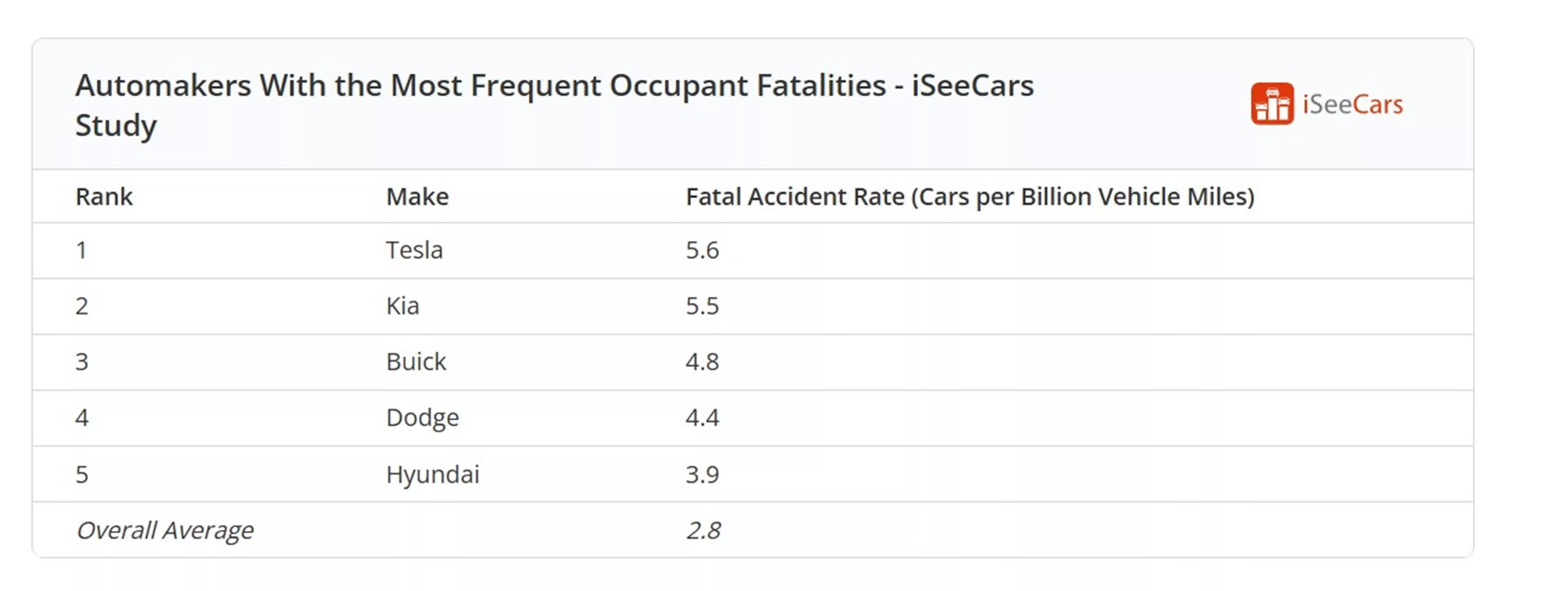The big picture: While Tesla has yet to respond to the iSeeCars report, regulators and consumers will closely watch the company's next moves. As autonomous and semi-autonomous vehicles become more prevalent, it is clear that the industry must grapple with the technical challenges of creating safer cars and the human factors that continue to affect road safety.
Tesla's long-standing reputation for producing the safest vehicles on the road has been called into question by a recent study from auto research firm iSeeCars. The report reveals that Tesla vehicles have the highest rate of fatal accidents among all car brands, contradicting the company's bold safety claims and challenging CEO Elon Musk's many assertions on the topic.
The study, which analyzed fatal collisions from 2017 to 2022 involving 2018 to 2022 car models, found that Tesla had 5.6 fatal accidents per billion miles traveled, narrowly surpassing Kia's 5.5 per billion miles. This statistic places Tesla at the top of the list for brands with the highest rate of deadly accidents.
Two Tesla models were singled out in the report. The Tesla Model Y ranked sixth among the most dangerous cars, with a fatal accident rate 3.7 times higher than the average car and 4.8 times higher than the average SUV. Meanwhile, the Tesla Model S showed a fatal accident rate double that of the average car.
These findings stand in stark contrast to statements made by Tesla CEO Elon Musk and the company's marketing materials. Musk has repeatedly claimed that Teslas are "the safest cars on the road," while the automaker markets its vehicles as "engineered to be the safest in the world."
The study's results are particularly noteworthy given Tesla's advanced driver assistance technologies, including Autopilot and Full Self-Driving (FSD). These systems are designed to reduce human error and enhance safety, yet the data suggests they may not be as effective as claimed.
Karl Brauer, an executive analyst at iSeeCars, told Rolling Stone that the elevated accident rates likely "reflect a combination of driver behavior and driving conditions" rather than inherent vehicle safety issues.
The discrepancy between Tesla's safety claims and real-world accident data has not gone unnoticed by regulators. Both the National Highway Traffic Safety Administration (NHTSA) and the Department of Justice are investigating whether Tesla misled customers about the capabilities of its Autopilot and FSD systems.
Critics argue that these advanced systems may lead to driver complacency or distraction, potentially contributing to accidents when manual intervention is required. Despite the concerning accident data and ongoing investigations, Elon Musk remains optimistic about Tesla's autonomous driving future.
Teslas are the safest cars on the road, but most people don't know that
– Elon Musk (@elonmusk) January 20, 2023
In October, Musk unveiled plans for a steering wheel-free Robotaxi or Cybercab, predicting production would begin before 2027. However, industry experts remain skeptical about Tesla's ability to compete with established players in the autonomous taxi market, such as Waymo, a Google subsidiary with an active fleet already in operation.
The study also highlights a concerning trend across the automotive industry. While modern vehicles are equipped with increasingly advanced safety features, rising accident and death rates suggest these improvements are being offset by distracted driving and higher speeds. Data from the study serves as a reminder that even the most advanced vehicle technologies cannot fully compensate for human behavior behind the wheel.

